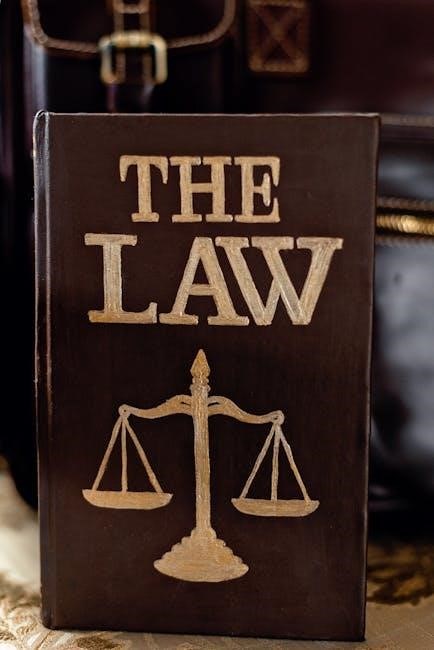What is a Non-Prosecution Affidavit?
A non-prosecution affidavit is a sworn statement where a victim formally requests that criminal charges not be pursued against a defendant. This document is crucial in influencing the legal process, reflecting the victim’s wishes regarding prosecution.

Purpose of a Non-Prosecution Affidavit
The primary purpose of a non-prosecution affidavit is to formally communicate the victim’s desire not to press charges, aiming to halt or significantly influence the criminal proceedings. This affidavit serves as a declaration, articulating the victim’s stance and reasons for not wanting prosecution, which can include desires for reconciliation, belief in the defendant’s innocence, or concerns about the impact of a trial.
It allows the victim to exercise their right to refrain from prosecution, acknowledging their agency in the legal process. The affidavit is often used in cases involving interpersonal conflicts like domestic violence or assault, where victims may prioritize family unity or personal healing over punitive measures.
By presenting a clear statement of non-prosecution, the affiant hopes to persuade the prosecutor to dismiss the case, recognizing that the victim’s cooperation is often vital for a successful conviction. However, the ultimate decision rests with the prosecutor, who must weigh the affidavit against other factors, such as public safety and evidence of guilt.

Common Use Cases for Non-Prosecution Affidavits
Non-prosecution affidavits are frequently utilized in various legal scenarios, particularly those involving close relationships or nuanced circumstances. Domestic violence cases often see these affidavits, where the alleged victim, perhaps seeking family preservation or believing in changed behavior, requests the dismissal of charges. Assault cases involving acquaintances or family members also commonly employ these affidavits, especially when reconciliation is desired.
Theft or fraud cases within families, where the victim might prioritize familial harmony over legal repercussions, represent another common use case. Additionally, these affidavits can appear in situations where the victim believes the defendant acted out of character or under duress, mitigating their culpability.
In some instances, victims may fear retaliation or further conflict if they pursue prosecution, leading them to file a non-prosecution affidavit. It’s also relevant when the victim has reached a private settlement or restitution agreement with the defendant, making further legal action unnecessary. Ultimately, these affidavits serve as a formal voice for victims who, for various reasons, choose not to seek criminal prosecution.

Key Elements of a Non-Prosecution Affidavit
A non-prosecution affidavit requires specific key elements: affiant information, incident details, and a clear declaration of non-prosecution. These components ensure the document’s validity and clearly express the affiant’s intent regarding the case.
Affiant Information
The affiant information section of a non-prosecution affidavit is crucial for establishing the identity and contact details of the person making the statement. This section typically includes the affiant’s full legal name, current address, and contact information, such as phone number and email address. Providing accurate and complete identifying details ensures the affidavit’s legitimacy and facilitates communication.
Furthermore, this section may also require other identifying details, such as the affiant’s date of birth or driver’s license number, to further verify their identity. It is essential that the affiant information is precise and truthful, as any discrepancies or false statements can have legal repercussions. The affiant must willingly provide all the information, ensuring they are fully aware of the implications of signing the affidavit.
This is an important part of the affidavit.

Incident Details
The incident details section of a non-prosecution affidavit provides a comprehensive account of the event that led to potential criminal charges. This section requires specific information about the incident, including the date, time, and precise location where it occurred. Describing the nature of the incident is crucial, requiring a clear and concise explanation of what transpired.
Providing detailed context helps to understand the circumstances surrounding the event and the reasons for seeking non-prosecution. The affiant should accurately describe their involvement and observations, ensuring the information aligns with their intentions. Including relevant facts and avoiding assumptions are essential for an objective portrayal.
The incident details section allows the affiant to present their perspective on the events, highlighting any mitigating factors or misunderstandings. It is crucial to provide an honest and thorough account, as this information plays a significant role in the prosecutor’s decision-making process. The affiant’s statement should be as accurate as possible.
Declaration of Non-Prosecution
The declaration of non-prosecution is the core component of the affidavit. It is a clear and unambiguous statement where the affiant expresses their explicit desire not to pursue criminal charges against the defendant. This declaration must be voluntary, meaning the affiant is making the decision of their own free will, without any coercion or external pressure.
The affiant acknowledges their right to request prosecution but consciously chooses to relinquish that right. This section often includes a detailed explanation of the reasons for not wanting to prosecute, such as a desire for reconciliation, belief in the defendant’s innocence, or recognition of mitigating circumstances.
The declaration should explicitly state that the affiant understands the implications of their decision and is aware that foregoing prosecution means the defendant may not be held criminally liable for their actions. The affiant may also affirm that they are not receiving any benefit or compensation for signing the affidavit and are acting solely based on their personal convictions. It is important that the declaration is truthful.

Rights and Responsibilities of the Affiant
Signing a non-prosecution affidavit carries significant weight, imbuing the affiant with specific rights and responsibilities. The primary right is the autonomy to decide whether to pursue criminal charges, reflecting the affiant’s agency in the legal process. However, this right is coupled with the responsibility to ensure the affidavit is truthful and voluntary.
The affiant must understand they are relinquishing their right to seek criminal punishment for the defendant’s actions. Any falsification within the affidavit can lead to legal repercussions, including perjury charges. It is incumbent upon the affiant to consider the long-term implications of their decision, as it may impact future legal proceedings.
They have the right to seek legal counsel to understand the ramifications of signing the affidavit. Furthermore, the affiant has the responsibility to appear in court if subpoenaed and to provide truthful testimony, even if it contradicts the initial affidavit. The affiant must also be aware that the prosecutor ultimately decides whether to dismiss the case, regardless of the affidavit.

Influence on Legal Proceedings
A non-prosecution affidavit wields considerable influence in shaping the trajectory of legal proceedings, though its impact isn’t absolute. While not binding, it can significantly sway a prosecutor’s decision-making process, particularly in cases involving interpersonal conflicts like domestic disputes or assaults where the victim expresses a desire not to press charges.
The affidavit serves as compelling evidence of the victim’s wishes, potentially leading to a reduction or dismissal of charges. Its influence is most pronounced when the victim’s testimony is crucial for the prosecution’s case. Without their cooperation, the likelihood of securing a conviction diminishes, making the affidavit a persuasive factor.
However, the prosecutor retains the discretion to proceed with the case, especially if there’s evidence of coercion, a history of violence, or public interest concerns. The affidavit’s influence also depends on its content and credibility. A well-drafted affidavit that clarifies discrepancies or presents a defense, like self-defense, carries more weight; Ultimately, the affidavit contributes to a nuanced evaluation of the case, impacting negotiations, plea bargains, and trial strategies.

Prosecutor’s Discretion and the Affidavit
While a non-prosecution affidavit expresses the victim’s desire to not pursue charges, the ultimate decision rests with the prosecutor. This discretion is a cornerstone of the legal system, ensuring that cases are evaluated based on broader considerations than just the victim’s preference. The prosecutor must weigh the affidavit against factors like public safety, the severity of the offense, and the potential for future harm.
Even with a compelling affidavit, prosecutors may proceed if there’s evidence of coercion or manipulation influencing the victim’s decision. Cases involving domestic violence often trigger heightened scrutiny, as prosecutors recognize the cycle of violence and the potential for victims to recant under pressure. The prosecutor also considers whether proceeding aligns with the interests of justice, even if the victim prefers otherwise.
Prosecutors assess the credibility and completeness of the affidavit. If discrepancies exist or if it appears the victim is minimizing the offense, the prosecutor may give it less weight. The affidavit informs the prosecutor’s decision but doesn’t dictate it. They retain the authority to pursue charges if they believe a crime has been committed and prosecution is warranted.

State-Specific Considerations (Texas Example)
In Texas, an affidavit of non-prosecution is a formal statement where an alleged crime victim expresses their wish not to press charges. While it can influence a prosecutor’s decision, it’s not binding, and prosecutors in Texas retain the discretion to proceed with a case. These affidavits are frequently used in domestic violence and assault cases.
Texas prosecutors often carefully evaluate these affidavits, especially in family violence situations, due to concerns about the cycle of violence and victim coercion. Even if the victim signs an affidavit, the prosecutor may still pursue charges if they believe a crime occurred. For an affidavit to be more effective in Texas, it should clearly explain why the victim doesn’t want to prosecute. It’s more persuasive when it provides detailed reasons, such as self-defense or a misunderstanding.
Victims must understand the implications of signing an affidavit in Texas, including relinquishing their right to pursue charges. It’s advisable for victims to seek legal counsel before signing, understanding that it may not guarantee the dismissal of the case. Texas law requires the affidavit to be voluntary and truthful.

When to Consider an Affidavit of Non-Prosecution
An affidavit of non-prosecution should be considered when a victim genuinely does not wish for criminal charges to proceed. This often arises in cases involving interpersonal conflicts, such as domestic disputes or minor altercations where the victim feels that pursuing charges would be unnecessarily punitive or detrimental to all parties involved.
It’s also appropriate when the victim believes that the alleged offense was a result of misunderstanding, accident, or self-defense. In situations where the victim and defendant have resolved their differences and are committed to reconciliation, an affidavit can signal to the prosecutor that the victim does not perceive the defendant as a threat.
Before considering an affidavit, the victim should carefully weigh the potential consequences and seek legal advice to understand their rights and the implications of their decision. It’s crucial to ensure that the affidavit is made voluntarily, without coercion or duress, and that the victim is fully aware that signing it means relinquishing the right to pursue criminal charges. The affidavit should only be considered if the victim is confident in their decision and believes it is the best course of action.
